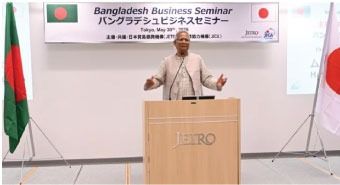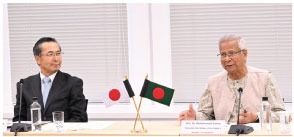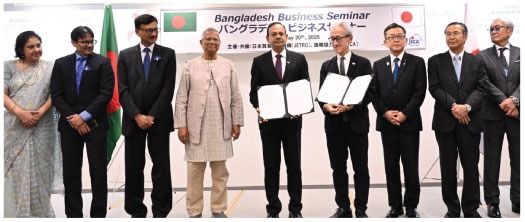- info@ficci.org.bd
- |
- +880248814801, +880248814802
- Contact Us
- |
- Become a Member
- |
- |
- |
- |
- |

About 330 Japanese companies are operating business in Bangladesh. Companies targeting domestic demand are on rise these days, while textile companies have manufactured products here for years. Bangladesh is scheduled to graduate from the Least Developed Countries (LDCs) status on 24 November 2026, and its population of over 170 million makes it an attractive market. It is obvious that more foreign companies including Japanese will come to do business in this country, helping to boost the economic growth if the investment environment gets better.
 One of the familiar challenges which Japanese companies in Bangladesh Bangladesh Business Seminar mention is lack of transparency and predictability at Customs. The systemic inefficiencies occurs variation in HS Code classification and document requirements by officials. Building a system that ensures consistent judgments and later reviews is important in trade transactions with peace of mind. In the respect, Bangladesh National Single Window (BDNSW) which became mandatory on 1 July 2025 will make a positive impact. It is a digital platform that enables traders to apply for and receive documents once to fulfill all regulatory requirements. According to National Board of Revenue (NBR), over 85 percent of the certificates, licenses, and permits (CLPs) issued so far through the system were delivered within an hour. It reduces customs clearance time, logistics cost of traders, and opportunities of face-to-face interaction. Traders can track each step taken by different authorities and where delays occurred since the platform records every action on a transaction.
One of the familiar challenges which Japanese companies in Bangladesh Bangladesh Business Seminar mention is lack of transparency and predictability at Customs. The systemic inefficiencies occurs variation in HS Code classification and document requirements by officials. Building a system that ensures consistent judgments and later reviews is important in trade transactions with peace of mind. In the respect, Bangladesh National Single Window (BDNSW) which became mandatory on 1 July 2025 will make a positive impact. It is a digital platform that enables traders to apply for and receive documents once to fulfill all regulatory requirements. According to National Board of Revenue (NBR), over 85 percent of the certificates, licenses, and permits (CLPs) issued so far through the system were delivered within an hour. It reduces customs clearance time, logistics cost of traders, and opportunities of face-to-face interaction. Traders can track each step taken by different authorities and where delays occurred since the platform records every action on a transaction.
 The integration of investment-related govern- ment agencies being progressed by the interim government will make their services investor-friendly. Some of the Japanese companies that visit JETRO Dhaka do not know even which investment bodies are the most appropriate to ask for a procedure. One Stop Service launched in 2019 by Bangladesh Investment Development Authority (BIDA) is a good attempt to provide investors an easy access to the services of respective bodies. I expect that BIDA's plan to enable single-application submission of five services by September which it signed MoU with six organizations such as NBR in May 2025 will come to fruition to further improve the ease of doing business in Bangladesh.
The integration of investment-related govern- ment agencies being progressed by the interim government will make their services investor-friendly. Some of the Japanese companies that visit JETRO Dhaka do not know even which investment bodies are the most appropriate to ask for a procedure. One Stop Service launched in 2019 by Bangladesh Investment Development Authority (BIDA) is a good attempt to provide investors an easy access to the services of respective bodies. I expect that BIDA's plan to enable single-application submission of five services by September which it signed MoU with six organizations such as NBR in May 2025 will come to fruition to further improve the ease of doing business in Bangladesh.

Therefore, in both trade and investment, human intervention in government agencies tends to cause various challenges. Advances in digitalization and systemization contribute to create an environment that makes foreigners easier to consider business. Bangladesh will graduate from LDC status as mentioned above and move forward to become a middle-income country. It is a suitable time to break away from manual operations.
Lastly, I would like to suggest the establishment of governmental service to help business matching between Bangladeshi and foreign companies. When foreign companies want to import tea from Bangladesh, for example, they might not know which companies to trust or how to contact them. Regarding investment, they are struggling to find local business partners. JETRO has an online catalog site "Japan Street" can be viewed only by a limited number of overseas buyers invited by us, and it lowers mental barriers of Japanese suppliers to export products overseas. It also coordinates meetings between Japanese and foreign companies. If there was a service in Bangladesh that introduced only trustworthy companies that had passed government screening, likewise, foreign companies would feel more comfortable doing business.






